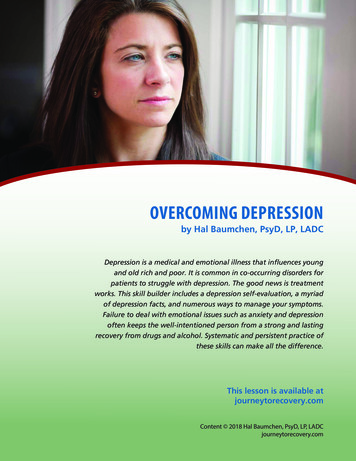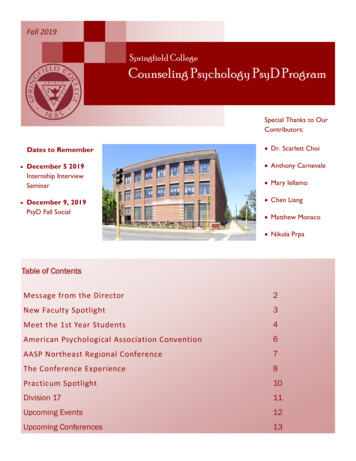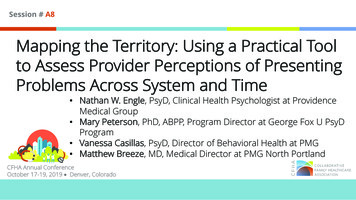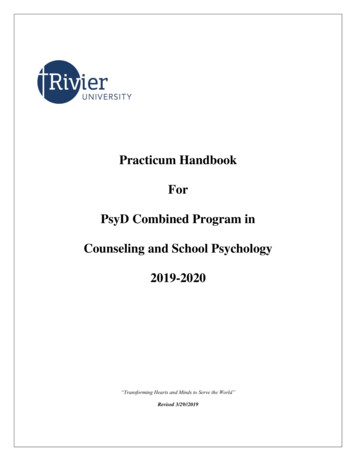
Transcription
OVERCOMING DEPRESSIONby Hal Baumchen, PsyD, LP, LADCDepression is a medical and emotional illness that influences youngand old rich and poor. It is common in co-occurring disorders forpatients to struggle with depression. The good news is treatmentworks. This skill builder includes a depression self-evaluation, a myriadof depression facts, and numerous ways to manage your symptoms.Failure to deal with emotional issues such as anxiety and depressionoften keeps the well-intentioned person from a strong and lastingrecovery from drugs and alcohol. Systematic and persistent practice ofthese skills can make all the difference.This lesson is available atjourneytorecovery.comContent 2018 Hal Baumchen, PsyD, LP, LADCjourneytorecovery.com
OVERCOMING DEPRESSIONIN THISCHAPTER Recognize thesigns of depression Evaluate currentdepressivesymptoms Discover waysto reduceand managedepressionWHAT IS DEPRESSION?Depression is a medical and emotional illness that influences young and old,rich and poor. It taps the shoulder of men and women alike. It may be chronicor occasional. Depression is global, indiscriminate toward race, has no culturallimitations, comes dressed in a myriad of dark colors, and often appearsdreadfully unique. If it has hurt you once in the past, it can hurt you again.Struggles with depression are common for co-occurring disorder clients. Thegood news is treatment works.TREATMENT WORKSEven though depression is complicated and life-encompassing, finding a senseof normalcy is possible. Depression is rarely, if ever, a one-issue illness and itstreatment must be comprehensive. It most often encompasses social, relational,occupational, financial, spiritual, emotional, and medical facets of life. Moresimply stated, depression touches every part of you. To be effective, treatmentmust target the troubled areas of living. If it has damaged you physically,medical intervention may be necessary. If it has weakened you socially,treatment can help strengthen your relationships. Going to the hospital for afew days when you are suicidal is vital, but it is not treatment for depression.An overnight stay in the psychiatric ward doesn’t solve problems, target issues,or supply comprehensive intervention to the many areas of life often ruthlesslyravaged by depression. A hospital stay may be an entrance ramp on your road torecovery, but should rarely, if ever, be regarded as the finish line.USING YOUR STRENGTHS AND ASSETSIn addition to targeting problem areas that surround and produce depression,it is extremely valuable to recognize your strengths and personal or emotionalresources. Recovery from depression is easier if you have a supportive spouse,All content Hal Baumchen, 2018. All Rights Reserved. Do not duplicate.Overcoming Depression page 1
PRACTICE of theskills presentedin your treatmentprogram WILLMAKE ADIFFERENCE.NOTEScompassionate group of friends, stable job, or a variety of other key qualities andattributes. Similar to tackling financial difficulties, when battling depression, assetsneed to be leveraged against personal liabilities. While it is helpful to understandwhat is wrong, recognizing your positive qualities is crucial. You can solve or reduceproblems more effectively, increase your strengths and assets more intentionally,and use these qualities against problems more strategically. Applying your strengthsagainst depression is key to your successful recovery.Watch for the tendency to think “I have every single imaginable problem andabsolutely no strengths, positive qualities, or notable attributes to help.” Depressiongrows with negativity and it feeds itself.SYMPTOMS OF DEPRESSION Sad mood or crying spells Trouble making decisions Low energy Low self-esteem Low motivation Suicidal thoughts Guilt, remorse, regret Difficulty concentrating Sleep problems Irritability Loss of interest in usual activities Hopelessness Loss of enjoyment Helplessness Low sex drive Fatigue Appetite changes Moving or speaking slowly Pessimism Unexplained aches and painsOH, THOSE NEGATIVE THOUGHTSMany who struggle with depression carry a mindset of negativity, pessimism,hopelessness, and despair. This becomes one of the primary targets in combatingdepression. If you win the frequently-fought minor skirmishes against negativity,you can win the war against depression. Failure to win, or reluctance to even engagein the battle against negative thinking, reduces the likelihood of success in the waragainst depression. Remember, you can change how you feel by learning to thinkdifferently. While not easy, it is possible with guidance, perseverance, and practice.A client recently told me “The long haul of anything is boring to me.” For her, to hearsteady and consistent practice over time is foundational for recovery was disheartening.Yet, with encouragement, she was willing to endure the boring and tedious for the sakeof success. Systematically practicing the skills presented in your treatment program orthis manual will make a difference in your journey to long-term sobriety.NEGATIVE THINKING PERMEATES OUR WORLDEverywhere you turn you can hear negativity. The news is filled with up-to-dateinformation on invasions, epidemics, disasters, terrorism, shootings, and impendingeconomic collapse. The instantaneous arrival of brutal and barbaric events causesalarm in even the most sedate and peaceful among us. Dwelling on present negativenews and past personal tragedies makes a convincing argument that danger islooming just ahead.Overcoming Depression page 2All content Hal Baumchen, 2018. All Rights Reserved. Do not duplicate.
“WHAT IF ” THINKINGNOTESThe one-two punch of swift negative news and the force of our own past tragedy canleave one worrying about the future. Anxiety, fear, and worry are all fueled by “whatif” thinking. “What if I get cancer?” “What if the economy crashes again?” Constantrepetition of negative beliefs magnifies the impact. Thoughts can spiral downward soquickly, be very emotionally damaging, and become difficult to control. Allowing yourmind to aimlessly wander the dark alleys of pessimism comes at great cost. Patterns setin motion can quite quickly become something you can no longer control or contain.ENTERTAINING NEGATIVE THOUGHTSThe negative things you hear or see may be fact, but continually reviewing themcauses damage. The possession of a poison may be risky and unwise, but it is thesustained ingestion of the poison that produces eventual calamity. Having a shortlived disappointing, pessimistic, or worrisome thought is not the same as continuallyrepeating it. I explained this concept to client and then asked her if she had just hada casual negative thought or more fully entertained it. “Entertained it?” she asked inhumorous disbelief. “Well, I heard it knock, invited it in, cooked it dinner, and thenI slept with it!” She understands, at least on one level, the tempting and seductivenature of negative thinking.DEPRESSION FACTS Depression affects 121 million people worldwide (Reddy, 2010). In 2014, an estimated 15.7 million Americans had at least one major depressiveepisode in the last year. That represents 6.7% of the adult (age 18 and older)American population (NIMH, 2015). Two-thirds of people suffering from depression do not seek necessary treatment(WHO, 2001). Eighty percent of all people with clinical depression who have receivedtreatment significantly improve their lives (CDC, 2016). The economic cost of depression is estimated at 210.5 billion a year, but thecost in human suffering cannot be estimated (Greenberg, 2015). In the United States depression ranks in the top three workplace issues, behindfamily crisis and stress (NNDC, 2016). Women experience depression about twice as often as men (Mayo, 2016). The rate of depression among veterans is five times higher than civilians(NNDC, 2016). By the year 2020, the World Health Organization (WHO) estimates depression willbe the number two cause of “lost years of healthy life” worldwide (Reddy, 2010). According to the U.S. Centers for Disease Control and Prevention (CDC), suicidewas the tenth leading cause of death in the United States in 2014 (CDC, 2014). Major depression is 1.5-3.0 times more common among first-degree biologicalrelatives of those with the disorder than among the general population(Nemade et al., 2007).All content Hal Baumchen, 2018. All Rights Reserved. Do not duplicate.Overcoming Depression page 3
NOTES One in four young adults will suffer an episode of depression before age 24(Kessler, 2005). Depression is the leading cause of disability in the United States among peopleaged 15-44 (NNDC, 2016).INEVITABLE DARK MOMENTS IN LIFEWith all the intense pain and agony that so often comes with depression, it is nowonder those who suffer wish it would fade away. Although I am a firm believerthat morning is coming, I also appreciate the contrasting darkness of night. Perhapsthere is value in the recognition and acceptance of some sad, grief-stricken, andmorose moods. Maybe the joys of life are painted in rich emotional hues andintentionally positioned against the backdrop of the bleak, gray, and dark. Thisknowledge allows me to accept the surprising variations in life rather than hatethem. As we work toward understanding depression, we can also learn to accept thelessons it teaches.DEPRESSION SELF-EVALUATIONThink about how you felt before entering treatment. Consider the items below andrate each pair using the scale. For the first example, if you had low energy, circle 1 or 2.If you had a high level of energy, circle 4 or 5. Continue through the entire list.1.Low Energy12345High energy2.Difficulty sleeping or sleepall the time12345Uninterrupted sleeping patterns3. No desire to be involved in activities12345Very involved in activities4.No desire for sex12345Healthy sex drive5.Aches and pains12345Feel great6.Loss of appetite12345Enjoy eating7.Sad12345Joyful8.Despairing and hopeless12345Hopeful and confident9.Irritable (low frustration tolerance)12345Pleasant (high frustration tolerance)10.Withdrawn12345Involved11.Mental anguish12345Peace of mind12.Low sense of self-worth12345High sense of self-worth13.Pessimistic (about the future)12345Optimistic (about the future)14.Negative (perceive mostcircumstances as negativeor even harmful)12345Positive (perceive mostcircumstances as positive and asopportunities for growth)15.Self-destructive (“I andothers would be better offif I weren’t here”)12345Self-preserving (“Glad I’m here”)(Anderson and Baumchen, p. 42-43)Overcoming Depression page 4All content Hal Baumchen, 2018. All Rights Reserved. Do not duplicate.
SCORING THE TESTNOTESIf you most often circled numbers 3 through 5, you are not struggling with depression.Most of the fluctuations on the right side of the scale can be explained by generalhealth, differing temperaments, and growing levels of maturity. A person of averagehealth and maturity, having an introspective or generally pessimistic temperament,would likely circle many 3’s, and not be depressed. A person of good health andmaturity, with an optimistic and outgoing personality, would likely circle 4’s and 5’s.My depression score is .Temperament and personality can affect many individual items on the inventory. Youcan get a rough determination of your depression level by adding up each circlednumber and comparing the total with the following ratings:45 – 75Likely not depressed35 – 44Mildly depressed25 – 34Depressed15 – 24Severely depressedREDUCING DEPRESSIONWhile depression can feel overwhelming, small things can make a big difference tohelp in your recovery. Look through the list of suggestions below and consider howyou might practice a few, beginning today. Be aware of what is causing your depression. Try to be optimistic about the future. Get socially active and find good emotional support. Make a weekly schedule of your daily activities and do not forget to includesocial activities. Find a hobby or two. Do some volunteer work to keep yourself active. Try to be aware of your negative thoughts and replace them with positive ideas. Focus on your positive experiences. Review what went right today, not what might go wrong tomorrow. Base your mood on your positive character traits rather than your weight, size, orgeneral appearance. Exercise daily. Set realistic goals and learn to accept that everyone has different abilities.Concentrate on your unique characteristics and positive accomplishments. Get professional help if depression symptoms persist. Therapy for depressioncan help increase problem-solving skills.All content Hal Baumchen, 2018. All Rights Reserved. Do not duplicate.In overcomingdepression, SMALLTHINGS MAKE ABIG DIFFERENCE.Overcoming Depression page 5
DEVELOP GOODSLEEP HABITS.Go to bed atthe same timeeach night anddevelop ritualsto help signal theend of the day.NOTESOvercoming Depression page 6 Learn to examine and change negative thought patterns, find more adaptivebehavior patterns, resolve relational conflicts, and learn social skills. Know and develop your strengths. Focus on your positive attributes andcharacteristics. Ask for help. A healthcare provider can help you find further treatment options. Keep your medical and other appointments. Stay on your medications and take them as directed. Do not make any changesto your medications without first consulting your doctor. Take time for yourself every day. Know your support system. Watch your stress level. Develop good sleep habits. Go to bed at the same time each night and developrituals to help signal the end of the day. Avoid stimulants like caffeine, nicotine,and alcohol. They will keep you awake and make it more difficult to rest. Get plenty of vitamin D. Practice gratitude. Consider using an antidepressant medication if you do not see improvement.Contact your physician for appropriate diagnosis and treatment. Get your mind off your problems. If you over-think your problems, they beginto crowd out all the good happening in your life. Give issues the thought theydeserve, but allow yourself time to have fun. Read a book, pursue a hobby, orengage in a favorite activity.All content Hal Baumchen, 2018. All Rights Reserved. Do not duplicate.
Watch for warning signs of all-or-nothing thinking. Look for thoughts like “Ialways perform poorly on important projects at work,” or “I will never get overthis break-up,” or “Now that the first night of my vacation went poorly, the wholetrip is ruined.” Such thoughts can lead to generalizing one negative experienceto other situations or the same situation in the future. For depressive thinkers,their whole world can crumble like a house of cards when one thing goes wrong. Think about seeking cognitive therapy. Someone with a depressive mindset maynot meet the criteria for clinical depression, but can likely benefit from cognitivetherapy to help battle against depressive thoughts. Therapists using thistechnique teach their clients how to identify their particular depressive thoughtsand then provide methods to challenge, negate, or fight against them. It really ispossible to boost your mood by changing the way you think.NOTESChoose two or three items from the list above to implement today.BETTER DAYS ARE AHEADFor someone battling depression, life can feel like an endless storm, a bottomless pit,and a night that never ends. The good news is that depression is treatable. Find good,solid support for your fight against depression and find people who also support yourrecovery. Hope is knowing better days are ahead. Even during the darkest night, weknow morning is coming.For additional resources, see the appendix.Even during thedarkest night, weknow MORNINGIS COMING.All content Hal Baumchen, 2018. All Rights Reserved. Do not duplicate.Overcoming Depression page 7
NOTESSOURCESAnderson, N.T. and Baumchen, H. (1999). Finding hope again. Ventura, CA: Regal.Centers for Disease Control and Prevention, (2016). Interventions: Benefits/depression intervention.Retrieved August 2016 from Centers for Disease Control and Prevention, (2014). Leading causes of death. Retrieved August 2016 -of-death.htmGreenberg, P.E., Fournier, A.A., Kessler R.C., and Pike, C.T. (2015). The economic burden of adults with majordepressive disorder in the United States (2005 and 2010). Retrieved August 2016 from , R. C., Berglund, P., Demler, O., Jin, R., Merikangas, K. R., & Walters, E. E. (2005). Lifetime prevalenceand age-of-onset distributions of DSM-IV disorders in the National Comorbidity Survey Replication. Archivesof General Psychiatry, 62(6), 593-602.Mayo Clinic Staff (2016). Depression in women: Understanding the gender gap. Retrieved August 2106 l Network of Depression Centers, (2016). Facts. Retrieved August 2016 from http://www.nndc.org/the-facts/Nemade, R., Rice, N., and Dombeck, M., (2007). Biology of depression. Retrieved August 2016 from ression-genetics-and-imaging/Reddy, M.S. (2010). Depression: The disorder and the burden. Retrieved August 2016 from 4/United States Department of Health and Human Services, The National Institute of Mental Health (2015).Major depression among adults. Retrieved August 2016 from ce/major-depression-among-adults.shtmlWorld Health Organization, (2001). Mental disorders affect one in four people: Treatment available but notbeing used. Retrieved August 2016 from http://www.who.int/whr/2001/media centre/press release/en/Overcoming Depression page 8All content Hal Baumchen, 2018. All Rights Reserved. Do not duplicate.
Content 2018 Hal Baumchen, PsyD, LP, LADC journeytorecovery.com This lesson is available at journeytorecovery.com Depression is a medical and emotional illness .










